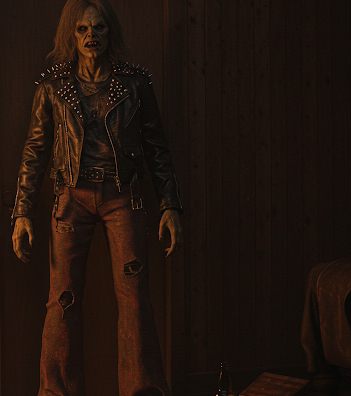4 faces of 70s . It's like someone threw a 70s rock party and then The Clash crashed it, armed with Molotov cocktails of righteous indignation... but wait, there's something darker lurking in the shadows.
You've got Led Zeppelin, right? The titans. The gods of rock Olympus. They're all about soaring vocals, epic guitar riffs that could carve mountains, and a kind of mystical, almost Tolkien-esque vibe. They represent the establishment of 70s rock, the untouchable legends. You can almost smell the patchouli and hear the roar of the crowd at a sold-out stadium.
And then BAM! The Clash barrels in. This isn't about lengthy guitar solos or mystical journeys. It's about raw energy, three-chord fury, and spitting truth to power. The Clash are the punk rock Prometheuses, stealing the fire of rebellion from the gods and handing it to the disaffected masses. "White Riot," "I'm So Bored with the U.S.A.," "Janie Jones" – these aren't just songs; they're manifestos, delivered with a sneer and a snarl. They're the sound of breaking down walls, not building them.
The Tubes... ah, The Tubes. They're the wild card in this deck. They're not quite the reverent rock gods, but they're definitely not straight-up punk either. They're more like the art-school provocateurs, gleefully skewering the excesses of rock culture with a healthy dose of theatricality and satire. They're the court jesters of this rock and roll kingdom, holding up a distorted mirror to the whole spectacle. "Dangerous" and "Don't Ask Me" suggest a band that's always ready to challenge expectations and push boundaries.
But let's not forget the looming presence of Black Sabbath, or rather their Sabotage! Because in the grand tapestry of 70s rock, Black Sabbath, particularly with an album titled Sabotage, represents a different kind of disruption. It's not the outright rebellion of punk, but more of an internal sabotage of the rock establishment. They’re the sound of the foundations of that Olympus cracking from within.
While Zeppelin soared to fantastical heights, Sabbath dragged rock into the murky depths of industrial Birmingham, with Tony Iommi's riffs as heavy as the factory machinery that defined the band's environment. Sabotage especially, feels like a descent into something darker and more visceral. There's a raw, almost paranoid energy, a sense that things are falling apart. They introduced a new kind of intensity to the rock landscape.
It's this tension, this push-and-pull between the established and the rebellious (and the self-destructive), that makes this playlist so compelling. It's not just a collection of songs; it's a conversation, a debate, a clash of ideologies. It's the sound of a decade in flux, a time when rock and roll was both a celebration of excess and a call to arms (or a descent into the abyss).
This playlist is a reminder that the 70s weren't just about one thing. It was an era of both bombastic grandeur and raw, unfiltered rage, and the creeping feeling that it could all be destroyed at any moment. It was a time when you could have gods, revolutionaries, and saboteurs coexisting (and sometimes clashing) on the same stage, on the same radio station, and, apparently, on the same playlist.
If this playlist were a movie, it would be a chaotic, exhilarating, and ultimately unforgettable ride. It's a middle finger to complacency, a fist-pump to the power of music, and a descent into the darkness that sometimes lurks beneath the surface of even the most bombastic rock and roll.

No comments:
Post a Comment